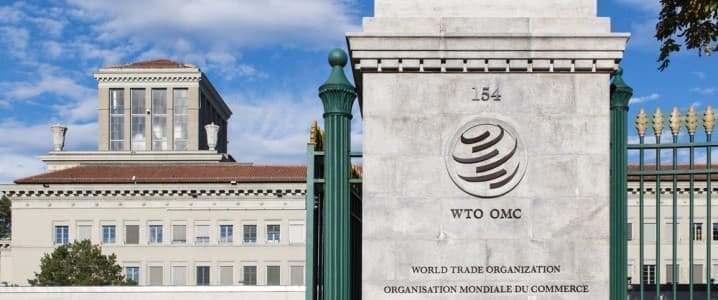As countries face record-high food prices, inflationary pressures and other challenges associated with the economic recovery from the Covid-19 pandemic, the 164 members of the World Trade Organisation (WTO) came together in June to pen several trade agreements to help address some of the world’s most pressing issues. In the body's first high-level meeting in five years, held in Geneva, representatives from member countries reached a landmark series of agreements on the export of food, illegal fishing, intellectual property (IP) restrictions for Covid-19 vaccines and Customs duties on electronic transactions.
Highlighting the significance and success of the summit, members achieved consensus on key issues that had been debated for decades in some cases.
Food exports and illegal fishing
One of the most pressing global challenges is food security. In the context of Russia’s invasion of Ukraine in late February, trade disruptions and global economic uncertainty, food prices have reached all-time highs, while the cost of agricultural and production inputs has also risen considerably.
The UN Food and Agriculture Organisation expects the global food import bill to reach a new high of $1.8trn in 2022, up $51bn on 2021.
This has raised concerns about food security, particularly in net-importing emerging markets – some of which have restricted food exports in order to bolster domestic supply.
To address the situation, the WTO lifted export restrictions on foodstuffs purchased for non-commercial humanitarian purposes by the UN World Food Programme. However, countries will still be permitted to restrict exports to ensure local food security.
Previously, such restrictions sought to block the export of subsidised public foodstuffs on the open market. India, however, strongly supports lifting these specific export controls – a topic that is expected to be discussed at the WTO’s next ministerial meeting in 2023.
Another important development for food security was the agreement to curb subsidies for illegal, unreported and unregulated fishing, as well as overfishing and vessels fishing in unregulated high seas.
The agreement has been described by supporters as key to reversing collapsing fish stocks around the world. However, critics say the measures do not go far enough, and have raised questions about the tangible impact they will ultimately have on global fish stocks.
The debate highlights the contentious nature of the reforms, which were agreed to after 20 years of failed negotiations. The topic is set to be addressed again next year, after member countries were unable to agree on curbs to subsidies related to high-capacity fishing fleets and those fishing in other members’ waters.
India seeks to export $14bn in marine products by 2025, and as such, has lobbied to invest in this industry in a way the proposed curbs would not allow.
Covid-19 vaccine IP rights
Perhaps no issue has divided developed economies and emerging markets more prominently over the last two years than Covid-19 vaccines. As of May 2022, 87.5% of all Covid-19 vaccine exports came from the EU (39.6%), China (32.2%) and the US (15.7%).
To help address the so-called vaccine divide, the WTO agreed to a partial waiver of IP rights for the jabs, which will give emerging markets the opportunity to produce generic versions for five years.
While many have welcomed the outcome, critics point out that the long delay has cost lives and may not be able to address the global glut of vaccines.
As of May 15.2bn doses of Covid-19 vaccines had been produced, of which 6.2bn doses were set to be traded. Of this supply, the European Federation of Pharmaceutical Industries and Associations said there were 2.1bn excess doses at risk of being destroyed upon expiration.
There was also criticism that the IP waiver did not cover therapeutics and diagnostics which could aid in the fight against the virus. The WTO has pledged to revisit this decision in six months.
A digital divide
The last, and arguably most contentious, agreement has extended the moratorium on applying duties to electronic transmissions – which includes software, emails, text messages, digital music, movies and more – until at least 2023.
The WTO agreed not to impose duties on such transmissions in 1998, but the digital economy has since grown exponentially. Global internet protocol traffic in 2022 alone will exceed all traffic up to 2016, according to the UN Conference on Trade and Development’s “Digital Economy Report 2021”.
The US and China account for the lion’s share of the world’s data, including 50% of its hyperscale data centres and 90% of the market capitalisation of the world’s largest digital platforms.
Related: Russia Says It Will Increase Gas To Europe If Canada Returns Its Turbine
Cross-border transmissions to emerging markets, including data-gathering on citizens, are essentially free for international companies, which many have argued has created a digital divide that emerging markets are eager to reverse.
A recent academic paper estimated that developing countries and the so-called least-developed countries lost out on $48bn and $8bn in respective potential duties on 49 digitised products from 2017 to 2020.
Given the regulation of cross-border data flows' implications for human rights, national security and law enforcement, and continuing debate about the trade-offs to imposing taxes, reaching consensus on how to bridge the digital divide will not be easy.
According to international media, India, Indonesia, Sri Lanka, Pakistan and South Africa reportedly threatened to block an extension of the moratorium before receiving assurances that the issue would be revisited at a later date.
A win for globalisation?
Given the headwinds of recent years – from the US-China trade war, to severe supply chain disruptions resulting from the pandemic – many have questioned the capacity of globalisation and traditional multilateral institutions to solve the world’s increasingly complex challenges.
By Oxford Business Group
More Top Reads From Oilprice.com:
- Buffett Buys Another $700 Million In Occidental Shares
- UK Authority Finds “Cause For Concern” In High Fuel Prices
- Why Is The U.S. Sending Its Emergency Oil Reserves To China?


















